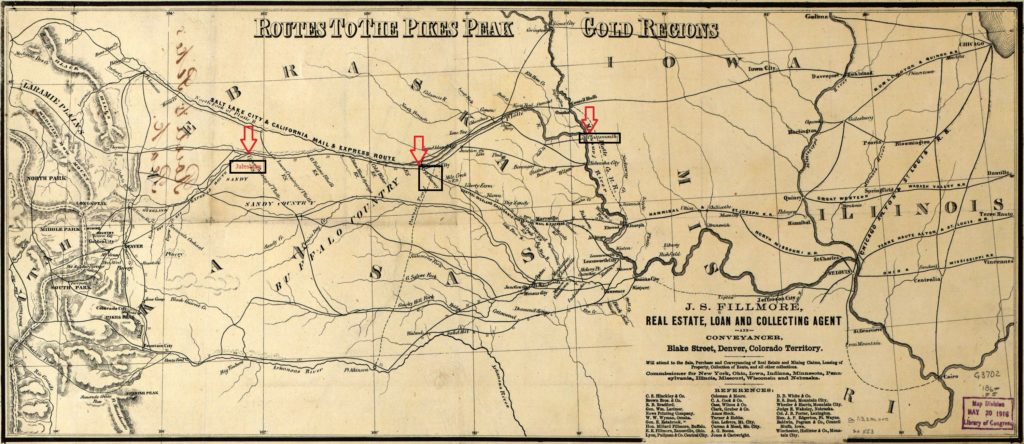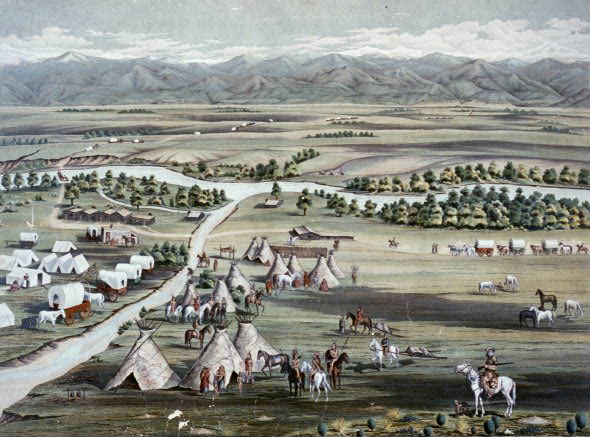A Pioneer Story: Pioneer Days, Part 5: Across the Plains of Nebraska to Denver

After a week or ten days of monotonous travel the small group was joined by a party of 6 young Germans from Minnesota whose carts were quite different from the wagons of the Booth party and which Laura described. She also noted being passed by groups with swifter teams going in the same direction, and then by other groups heading back the way they had come (some without even setting foot in the mining regions of the mountains).
Signs of Indians began to be sighted, the remains of campfires and pieces of broken equipment left behind. These were discovered to be Potawatomies, a quiet and peaceful tribe, who were very interested in the group’s belongings and the Booth baby (Nettie). Laura noted that they rather enjoyed the novelty of meeting the Indians as a way to break up the monotony of travel, except for one problem. One of the Booth teams of oxen was young and very aware of the approach of any Indians (Laura thought because of their sense of smell but it isn’t clear why she thought this). This young team took more and more dislike to the Indians and “persisted in plunging and tearing around at such a rate as to make it anything but pleasant to ride behind them.” Blindfolding the animals was not found to help and the group had to pass right by “not stopping to parlay with these interesting specimens of humanity.”
Next, Laura remembered in the midst of this lonely terrain where they only had themselves and occasionally a small group of Indians, one day they saw a rider coming from afar. This lone rider was galloping as fast as his horse could go. The flap, flap of his saddle bags proclaims this the Pony Express” but to be sure one of the group cried out the question. And “as he rushes by without halting a moment the answer comes back, ‘Pony Express—six days and a half from San Francisco.’” The slow Booth caravan was said to be still four weeks from the halfway point to San Francisco when they encountered this rider. The Pony Express had recently been established to carry mail, messages, and newspapers from the West Coast to the East (early 1860). Soon afterward Laura notes they came to the location of Ft. Kearney, an old trading post and landmark on the road they were following (marked on the map above).
As the group moved on from this point they again had a stream of travelers passing them, in both directions. By this time, they were about a week away from Julesburg, another landmark on the road. They hoped to reach it by the Fourth of July. Another brief diversion from the monotonous travel was described as the group of young men from Minnesota began to engage in a family quarrel. They got to the point that each wanted to dissolve the partnership they traveled in and go their own ways. This was not feasible however based on the number of carts and teams they had: there was no way of dividing the animals and if one group bought the other out there would be a party then stranded hundreds of miles from their destination. Finally some of the older men in the caravan were called on to arbitrate and the final solution was to go on as they had until they reached the end of the trip.
The group reached Juleburg the evening before the Fourth of July. It was decided to celebrate the Fourth with a gun salute, having no fireworks with them and no place to acquire any. They would then travel only a short way and rest the remainder of the day. Taking a day of rest was apparently a topic of discussion among the travelers, some of whom wanted to always press on but the majority of the group appreciated a day to read and write and meditate (certainly Laura must have wanted such a chance).
On the sixth of July the group again took to the road and continued toward Pike’s Peak and Denver. A few days of travel brought them close enough to finally begin to see the mountains they were traveling toward, and to bring them within a few days of their goal. The Booths began to talk of Denver and speculate about its appearance and to wonder about finding houses. When they reached Denver they were surprised to see how scanty the vegetation was. “And now the thot occurs, ‘What will become of the stock? Where will they find sustenance? They cannot live in a country like this.” The landscape around Denver was dry and barren, reportedly due to a drought. A ranch not far away was found which would take the animals. With no housing immediately found, the Booths left Denver for the outskirts and a little “city of tents” where they found a place for their own tents. And here we will leave them for now.

Source: Library of Congress Prints and Photographs Division Washington, D.C. 20540

Leave a Reply